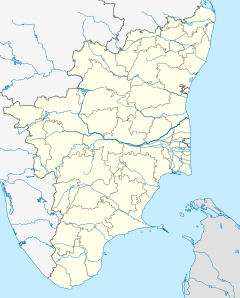
Tiruvalithayam Tiruvallesvarar Temple is a temple dedicated to the Hindu deity Shiva, located at Padi, a north-western neighbourhood of Chennai, India. Shiva is worshiped as Tiruvalleswarar, and is represented by the lingam and his consort Parvati is depicted as Jagathambikai. The presiding deity is revered in the 7th-century Tamil Saiva canonical work, the Tevaram, written by Tamil poet saints known as the nayanars and classified as Paadal Petra Sthalam.

Tiruppukkozhiyur is a Hindu temple dedicated to the deity Shiva, located in Avinasi, a panchayat town in Tiruppur district in the South Indian state of Tamil Nadu. Shiva is worshipped as Avinasiappar, and is represented by the lingam. His consort Parvati is depicted as Karunambigai. The presiding deity is revered in the 7th century Tamil Saiva canonical work, the Tevaram, written by Tamil saint poets known as the Nayanars and classified as Paadal Petra Sthalam.

Someswarar Temple is a Hindu temple dedicated to the deity Shiva, located in Kumbakonam, Tamil Nadu, India. Shiva is worshipped as Someswarar and is represented by the lingam. His consort Parvati is depicted as Somasundari. The presiding deity is revered in the 7th century Tamil Saiva canonical work, the Tevaram, written by Tamil saint poets known as the nayanars and classified as Paadal Petra Sthalam.
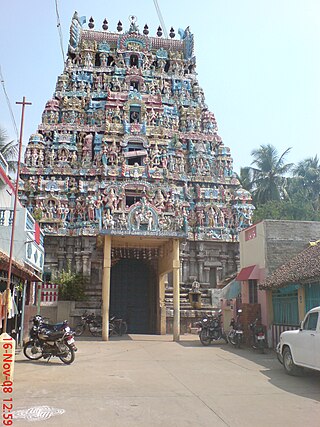
Kasi Viswanathar Temple, Kumbakonam is a Hindu temple dedicated to Lord Shiva, located in Kumbakonam, Tamil Nadu, India. Here, Lord Shiva is worshipped as Kasi Viswanathar, and His consort Parvati is depicted as Visalakshi. The presiding deity is revered in the 7th-century Tamil Saiva canonical work, the Tevaram, written by Tamil saint poets known as the nayanars and classified as Paadal Petra Sthalam.
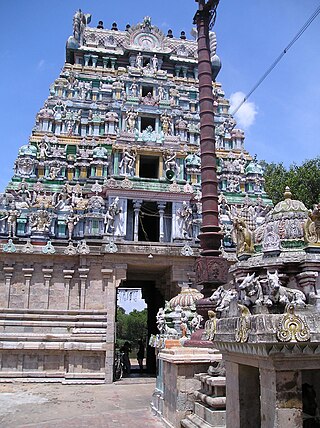
Kalyanasundaresar Temple, Nallur or Thirunallur is a Hindu temple dedicated to the deity Shiva in Nallur, Tamil Nadu, India. It is located 10 km (6.2 mi) away from Kumbakonam, 6 km (3.7 mi) east of Thirukkarugavur, and 30 km (19 mi) south of Thanjavur.
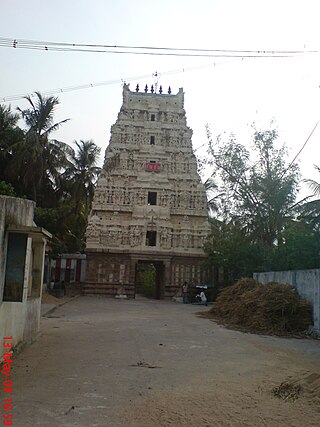
Anbil Alanthurai Temple is a temple dedicated to Shiva, located on the banks of the Kollidam river in Anbil, a small village near Lalgudi. is a Hindu temple dedicated to Shiva located in the village of Tiruchotruthurai, Tamil Nadu, India. Shiva is worshiped as Sathyavaheeswarar, and is represented by the lingam and his consort Parvati is depicted as Soundaranayagi. The presiding deity is revered in the 7th century Tamil Saiva canonical work, the Tevaram, written by Tamil poet saints known as the nayanars and classified as Paadal Petra Sthalam.

Sivayoginathar Temple also known as Yoganandeswarar temple is a Hindu temple dedicated to Shiva located in is located in Thiruvisanallur in Thanjavur district, Tamil Nadu, India. Shiva is worshiped as Sivayoginathar, and is represented by the lingam and his consort Parvati is depicted as Mangala Nayagi. The presiding deity is revered in the 7th century Tamil Saiva canonical work, the Tevaram, written by Tamil poet saints known as the nayanars and classified as Paadal Petra Sthalam.

Prananadeswarar Temple is a Hindu temple dedicated to Shiva located in Thirumangalakudi in Mayiladuthurai district of Tamil Nadu, India. Shiva is worshiped as Prananatheswarar, and is represented by the lingam and his consort Parvati is depicted as Mangala Nayagi. The presiding deity is revered in the 7th century Tamil Saiva canonical work, the Tevaram, written by Tamil poet saints known as the nayanars and classified as Paadal Petra Sthalam.

Sakshinatheswarar Temple or Thiruppurambiyam Temple is a Hindu temple dedicated to the God Shiva located in Thiruppurambiyam, Tamil Nadu, India. Shiva is worshipped as Sakshinathar, and is represented here by a Lingam. His consort, Parvati, is depicted as Ikshuvani. The presiding deity is revered in the 7th century Tamil Saiva canonical work, Thevaram, written by Tamil saint poets, known as the Nayanmaars and classified as Paadal Petra Sthalam.

Odhanavaneswarar Temple, Tiruchotruturai is a Hindu temple dedicated to Shiva located in the village of Tiruchotruthurai, Tamil Nadu, India. The Five Rivers are Vadavaru, Vennaaru, Vettaaru, Kudamuruttiyaaru and Kaaviriyaaru. Shiva is worshiped as Odhanavaneswarar, and is represented by the lingam and his consort Parvati is depicted as Annapoorani. The presiding deity is revered in the 7th century Tamil Saiva canonical work, the Tevaram, written by Tamil poet saints known as the nayanars and classified as Paadal Petra Sthalam.
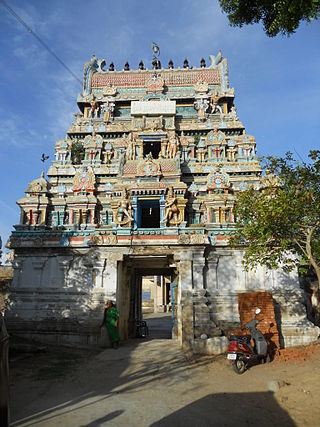
Padikasu Nathar Temple is a Hindu temple located at Azhagaputhur, a village in the Thanjavur district of Tamil Nadu, India. Shiva is worshiped as Padikasunathar, and is represented by the lingam. His consort Parvati is depicted as Soundaranayagi. The presiding deity is revered in the 7th century Tamil Saiva canonical work, the Tevaram, written by Tamil saint poets known as the nayanars and classified as Paadal Petra Sthalam. The 8th century Saiva saint poet Sundarar has sung praise about the temple in his works.

Chandramowleeswarar Temple, Thiruvakkarai in Thiruvakkarai, a village in Villupuram district in the South Indian state of Tamil Nadu, is dedicated to the Hindu god Shiva. Constructed in the Tamilian style of architecture, the temple is believed to have been built during the Cholas period in the 10th century. The temple has received gracious endowments from the Chola queen Sembiyan Mahadevi. Shiva is worshipped as Chandramowleeswarar and his consort Parvathi as Amirthambigai.

Othandeeswarar Temple in Thirumazhisai Chennai City in Tiruvallur district in the South Indian state of Tamil Nadu, is dedicated to the Hindu god Shiva. It is located 22 km from the state capital Chennai. Constructed in the Dravidian style of architecture, the temple was built during the 11th century by Chola king Kulothunga Chola II. Shiva is worshipped as Othandeeswarar and his consort Parvathi as Kulirvithanayaki.

Metraleeswarar Temple is a Hindu temple dedicated to Shiva, located in Pillaiyar Palayam area in Kanchipuram, Kanchipuram district in Tamil Nadu, India. Metraleeswarar is revered in the 7th-century CE Tamil Saiva canonical work, the Tevaram, written by Tamil saint poets known as the nayanars and classified as Paadal Petra Sthalam, the 275 temples revered in the canon. The temple is believed to have expanded during the 13th century by Later Cholas as indicated in the inscriptions.

Kripapureeswarar Temple in Thiruvennainallur, a panchayat town in Villupuram district in the South Indian state of Tamil Nadu, is dedicated to the Hindu god Shiva. The presiding deity is revered in the 7th century Tamil Saiva canonical work, the Tevaram, written by Tamil saint poets known as the Nayanmars and classified as Paadal Petra Sthalam. The temple is closely associated with Sundarar, the saivite saint of the 8th century, who started composing his Tirumurai starting with "Pitha Piraisudi" verse in this temple.
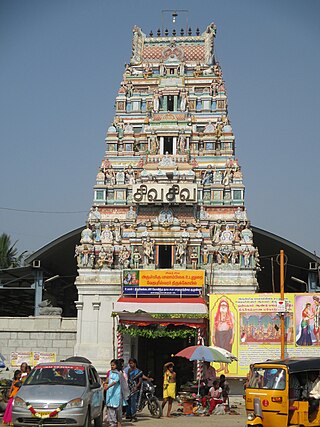
Vedapureeswarar Temple or Eswaran Dharmaraja Koil is a Hindu temple dedicated to the deity Shiva, located in Thiruverkadu, a Municipality in Tiruvallur district in the South Indian state of Tamil Nadu. Shiva is worshipped as Vedapureeswarar, and is represented by the lingam. His consort Parvati is depicted as Balambigai. The presiding deity is revered in the 7th century Tamil Saiva canonical work, the Tevaram, written by Tamil saint poets known as the Nayanars and classified as Paadal Petra Sthalam.
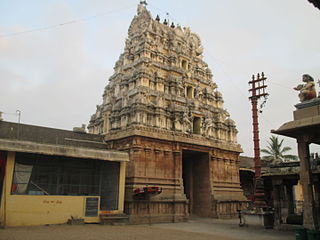
Veerateeswarar Temple in Tirukoilur, a panchayat town in Kallakurichi district in the South Indian state of Tamil Nadu, is dedicated to the Hindu god Shiva. Constructed in the Dravidian style of architecture, the temple is believed to have been built during the Cholas period in the 10th century. Shiva is worshipped as Veerateeswarar and his consort Parvathi as Periyanayagi.
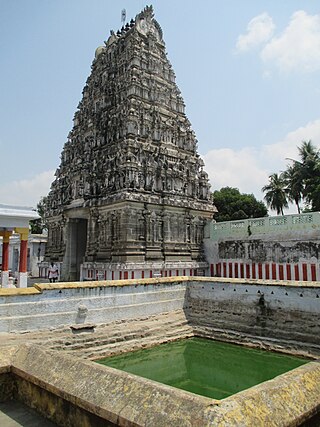
Thirumakaraleeswarar Temple is a Hindu temple dedicated to the deity Shiva, located in Magaral, a village in Kanchipuram district in the South Indian state of Tamil Nadu. Shiva is worshipped as Thirumakaraleeswarar, and is represented by the lingam. His consort Parvati is depicted as Tribuvananayagi. The presiding deity is revered in the 7th-century CE Tamil Saiva canonical work, the Tevaram, written by Tamil saint poets known as the Nayanmars and classified as Paadal Petra Sthalam.
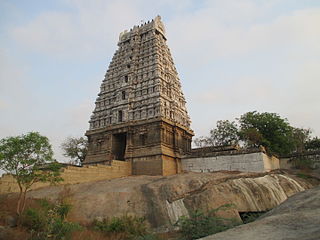
Atulya Nadheswarar Temple is a Hindu temple dedicated to the deity Shiva, located in Arakandanallur in Thirukoilur taluk, a town panchayat in Viluppuram district in the South Indian state of Tamil Nadu. Shiva is worshipped as Atulya Nadheswarar, and is represented by the lingam. His consort Parvati is depicted as Azhagiya Ponnazhagi. The presiding deity is revered in the 7th century Tamil Saiva canonical work, the Tevaram, written by Tamil saint poets known as the Nayanars and classified as Paadal Petra Sthalam.
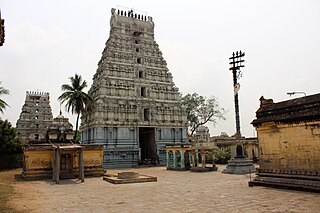
Abirameswarar Temple is a Hindu temple dedicated to the deity Shiva, located in thiruvamaathur, a village in Viluppuram district in the South Indian state of Tamil Nadu. Shiva is worshiped as Abirameswarar, and is represented by the lingam. His consort Parvati is depicted as Manonmani Amman. The temple is located on the Chennai - Villupuram highway. The presiding deity is revered in the 7th century Tamil Saiva canonical work, the Tevaram, written by Tamil saint poets known as the nayanmars and classified as Paadal Petra Sthalam.

